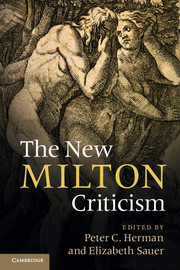Book contents
- Frontmatter
- Contents
- Notes on contributors
- Acknowledgments
- Note on editions
- Introduction Paradigms lost, paradigms found: the New Milton Criticism
- Part I Theodicies
- Chapter 1 Milton’s fetters, or, why Eden is better than Heaven
- Chapter 2 “Whose fault, whose but his own?”
- Chapter 3 The political theology of Milton’s Heaven
- Chapter 4 Meanwhile: (un)making time in Paradise Lost
- Chapter 5 The Gnostic Milton: salvation and divine similitude in Paradise Regained
- Chapter 6 Discontents with the Drama of Regeneration
- Part II Critical receptions
- Index
- References
Chapter 4 - Meanwhile: (un)making time in Paradise Lost
Published online by Cambridge University Press: 05 June 2012
- Frontmatter
- Contents
- Notes on contributors
- Acknowledgments
- Note on editions
- Introduction Paradigms lost, paradigms found: the New Milton Criticism
- Part I Theodicies
- Chapter 1 Milton’s fetters, or, why Eden is better than Heaven
- Chapter 2 “Whose fault, whose but his own?”
- Chapter 3 The political theology of Milton’s Heaven
- Chapter 4 Meanwhile: (un)making time in Paradise Lost
- Chapter 5 The Gnostic Milton: salvation and divine similitude in Paradise Regained
- Chapter 6 Discontents with the Drama of Regeneration
- Part II Critical receptions
- Index
- References
Summary
Ring the bells that still can ring
Forget your perfect offering
There is a crack, a crack in everything.
That’s how the light gets in.
Leonard Cohen, “Anthem”
What does it mean to count the days in Paradise Lost, to plot its chronology? Indeed, can one count out the poem’s time and by such counting account for time, and what is at stake in this arithmetic? Why do we need to be assured that thirty-three days pass? Or maybe only twenty-eight or twenty-nine plus four, those four being days of a different durée, not days as we know them (as if the others were, although Raphael says that he has “measure[ed] things in Heav’n by things on Earth” [6.893] – but what “things”?). Accounting for time – so many days for fighting, falling, weltering, circling, traversing each colure, destroying, creating – assumes (and is then offered as proof of) a narrative coherence and an epistemological certainty, which may be more illusory than not. Of course, the materials are all there and as readers suspended in our own time, we are busy counting; arithmeticians all, we sum those thirty-three days to make them (Eureka!) equal the life span of Christ and we know with numeric certainty that the absolute center of the original ten-book text is the word “ascended,” as the Son, “the copious matter” of the poet’s song as he had promised in Book 3, caesura to follow, steps up into the chariot of paternal deity. No doubt Milton liked to play numerological games (one might pity the amanuenses who had to do the counting and the adjusting to make it work out), but even as the text asks us to count, it baffles our certainties. Indeed as reader-accountants we are rather like Satan, the ultimate literalist, time’s accountant. Surveying the Eden he has returned to undo in Book 9, Satan glories how:
in one day [he had] marr’d
What he Almightie styl’d, six Nights and Days
Continu’d making, and who knows how long
Before had bin contriving, though perhaps
Not longer then since I in one Night freed
From servitude inglorious welnigh half
Th’Angelic Name.
(136–42; emphasis added)
- Type
- Chapter
- Information
- The New Milton Criticism , pp. 85 - 101Publisher: Cambridge University PressPrint publication year: 2012
References
- 5
- Cited by

